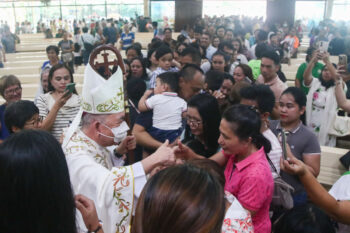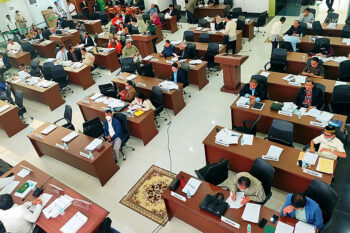[Eidu l-fitr khutbah delivered at the lawn garden of the Romulo Hall, University of the Philippines Diliman on 28 July 2014].
Assalamu alaykum wa rahmatullahi wa barakatuh.
All praise is due to Allah (SWT) the Lord of the Universe, the One who obliges His creation to follow His Command. He sets term or ajal to various ummah (communities) as He shows the signs in creation and in men until they know the Truth.
Today, we are on the day of Eidu l-fitr, the day of joy and happiness among believers. Their joy and happiness is simple; it is not measured with mere worldly gains. It transcends petty needs and desires. It connects with the guarantee assured on them in terms of their spiritual development. It is a guarantee [that is] part of the over-all logic of their ibadah or worship.
There is a known hadith (Prophetic saying) from Abu Hurayrah (RA) where Prophet Muhammad (SAW) said: “the person who fasts in the Month of Ramadan with faith self scrutiny will have his part of sins remitted.”
This assurance is the source of their joy and happiness whenever the Ramadan ends and the Eidu l-fitr starts. It is a guarantee that every believer has been given. Note the hadith speaks of eimanan wakhtisaban – a faith with self-scrutiny. In other words, it is something deeper; it should lead to one’s understanding of himself through deeper realization in the Holy Month of Ramadan. It is not mechanical or simply to fulfill a ritual. It should make us scrutinize (ikhtisaban) ourselves and firm up our faith both in the Holy Month of Ramadan and other months as well.
There is also a hadith from Abu al-Kudri, Prophet Muhammad (SAW) said: “When a person fasts a day for the sake of Allah then Allah drives away the hell from him to distance of 70 years of travel.”
This is another guarantee given to the believers, a reason why they are joyful and happy in this day. Now, notice there is a physical distance identified here. But as we had narrated in several of our khutbah (discourse) last Ramadan, distance implies normative quest for nearness captured with the Qur’anic verse: “When My servants asked thee concerning Me, I am indeed close (to them) (Baqarah: 185).” It suggests that those who fast (saimun) should strive to become muqarrabun – those who are near to Allah (SWT).
In other words, distance implies relationship of nearness with Allah (SWT). This guarantee is something that makes the believers happy and joyful in this day.
There is a another hadith from Sahl bin Said, Prophet Muhammad (SAW) said: “there is a gate in Paradise known as Ar-rayyan, through which only fasting persons will enter in the Day of Judgment and no one else. It will be said: where are the fasting persons? They will come forward. No one will enter that level of Paradise except the people who engage in fasting.
After they have entered, the gate will be closed and no one else will enter thereafter.”
This is yet another guarantee and promise given to those successful saim who had done their fast with faith self-scrutiny (eimanan wakhtisaban). So, even if we say that our joy and happiness is simple, yet, the guarantee is immense. This is the importance of Eidu l-fitr and why we have to join hands and share our joy together, including our zakatu l-fitr (Eid charity) as we partake food and share our blessing together. This is our way to express our simple joy and happiness with other brothers and sisters.
There is another tradition of the Prophet (SAW) whenever Eidu l-fitr or Eidu l-adha comes. He would usually rally the sahabah (companions) to perform congregation and he would instruct them to engage in things like sharing their blessings and wealth, sharing their food, and addressing the problems of the community. This is an important social function of Ramadan and Eidu l-fitr. It is part of our task today. We have to show concern and discuss matters that the ummah (community) faces. And we have to do something to lessen the pangs of suffering and difficulty of oppressed quarters of the ummah.
This point is very important. As we know, Ramadan 2014 is punctuated with lots of challenges reflective with what the Qur’an refers to as ajal or some form of term or experience. The Qur’an says: “To any people is a term appointed. When their term is reached, not an hour can they cause delay nor an hour can they advance it (in anticipation) (A’raf: 34).”
While the notion of ajal speaks of term or some kind of an end of a particular event, it may also be broadened to include the challenges or problems that the ummah faces. We have seen it most vividly in the Middle East today – in Gaza, in Syria, in Libya, in Iraq, and other parts of the Muslim world. We pray that their ajal would lighten up that it would trigger the ummah to move forward and develop further.
The challenge of the ummah is such that it has become cyclical. The war in Gaza is not new. There had been series of war with the same intensity in the past. It is due to many reasons, although when we speak of ajal it is something inscrutable. We are not able to fully grasp or understand why a certain ummah or community would have to experience so severe a difficulty and why others are not. What is obvious to us is such, there are social, political and economic factors underlying the cyclical war in the Middle East.
If you have attended our Friday khutbah these past several months or years, we have discussed in some details the socio-political and economic factors that lead into the crisis in the Middle East and other parts of the Muslim world these days.
Yet, this should not become a reason for us to become cynical or pessimistic. The ummah has long been the object of suspicion as they increase in number beyond the traditional domain of daru l-islam or the Muslim world. They have been perceived as threats in many quarters, as they also have problems with securing political stability and development among themselves. Hence, many of them have to be subjected to manifold form of oppression like the Palestinians in Gaza and other parts of the Occupied territories. In other words, the suffering of the ummah is nothing new.
What is worrisome however is that, even as war is going on in many countries in the Middle East, we feel it is not simply the issue of violence that is at hand. It is the sense of humanity of people around the world that is put into question. We pray that the difficulty and suffering of the Palestinians in Gaza and other parts of the Occupied Territories be eased substantially. What we worry is not simply the brutality and violence inflicted against the Palestinians. What we are vey much concerned of is the silence of the international community and inaction of big powers where Israel’s impunity is already accepted as a new normal.
Violence is unsustainable. It is repugnant to human nature. Violence has to end because it strikes at the very heart of man’s sense of humanity towards life and other living creatures. It is self-defeating for certain groups of people to insist that they are the only ones who have the right to live.
Human right is universal. The right to life is the right of everyone.
Even how worse a criminal or killer is, there is a light in one’s heart. We do not know why there are people who are so heartless who could not see and feel the suffering of other people like the women and children in Gaza and other parts of the world. What is worrisome, too, is if we are not triggered to extend assistance and to help those suffering people in countries mentioned. Finally, what we worry is a new normal that would emerge out of inhuman acts of aggression and the extreme brutality done by other people against helpless civilians.
We pray that the people of Gaza and many parts of the Muslim world would be able to ease with their difficulty and suffering. We pray that the ummah would be awaken to extend assistance including the need to put their resources together so that they would be able to play their role effectively in the international community. [MindaViews is the opinion section of MindaNews. The author is Associate Professor of Islamic Studies, University of the Philippines].







